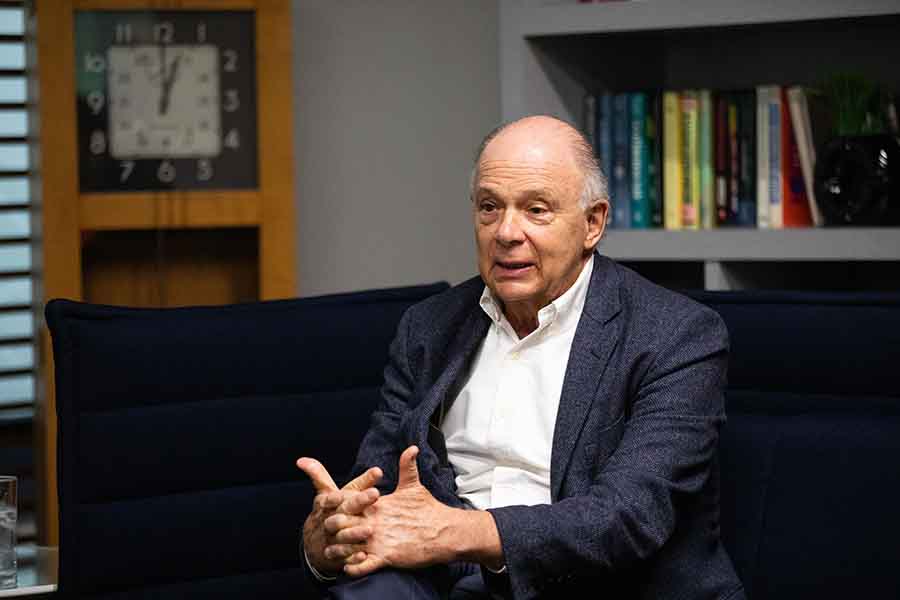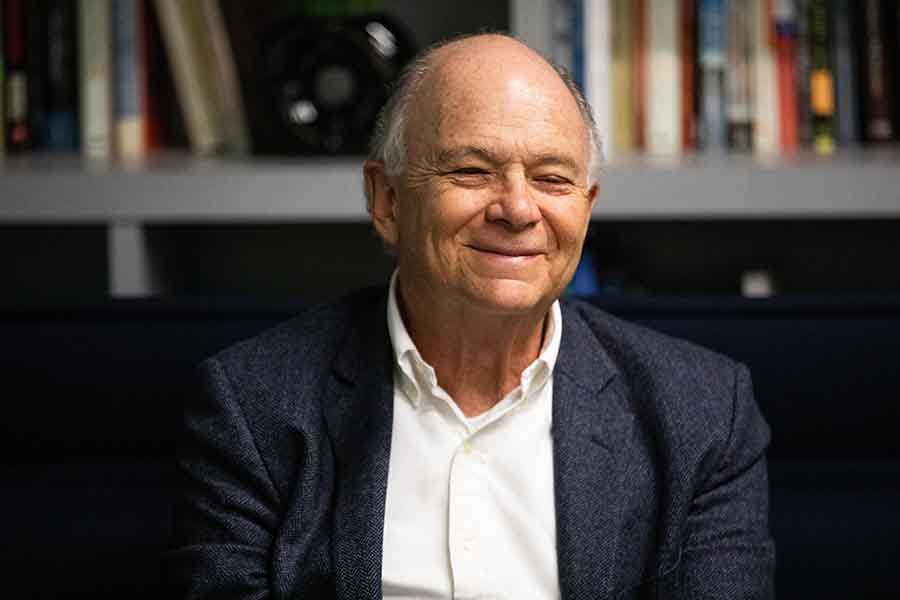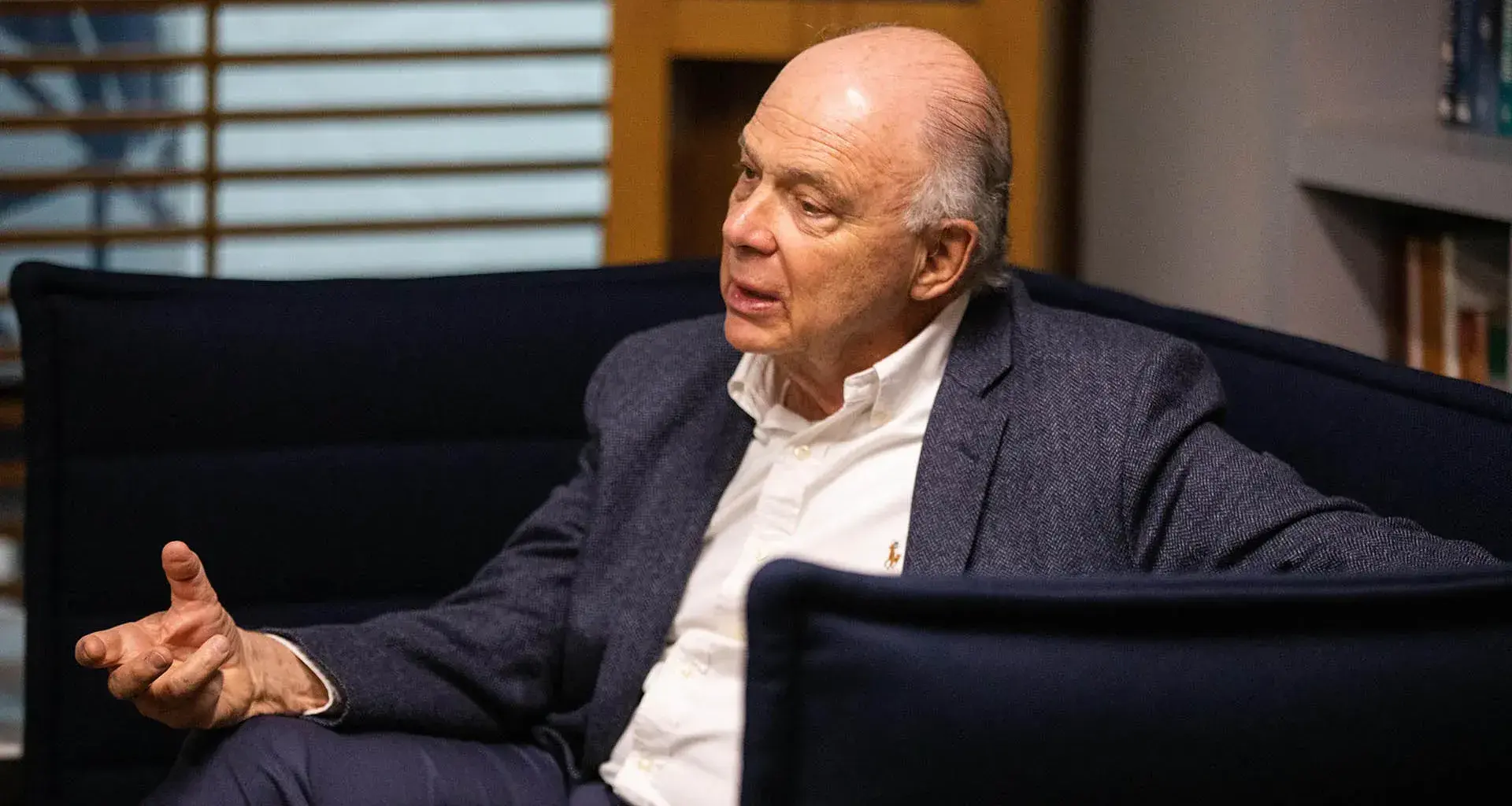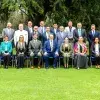In a space full of literature and books on Tec de Monterrey’s Monterrey campus, Enrique Krauze smiles.
Almost a thousand kilometers from Parque México in Mexico City, the Mexican writer and historian remembers his childhood and how he began his intellectual journey in that landmark of the Condesa neighborhood.
There, walking hand-in-hand with his paternal grandfather among gardens, fountains, ponds, ash trees, and cedars, is where his love for ideas and history began.
“I’ve been very fortunate to have had the grandparents I had to guide me,” he says.
In an interview with CONECTA, he talks about his past and provides details behind his recent autobiographical book: Spinoza en el Parque México.

Grandparents and his intellectual awakening
“This book is an intellectual autobiography,” says Krauze, 75.
He adds that he hopes to soon write the second part of his autobiography, focusing on the intellectual debates of the last 40 years in Mexico and Latin America.
But for now, the focus is on his childhood, his youth, and his quest for knowledge.
Krauze says that he began his intellectual journey walking alongside his teacher: his grandfather.
There, in the paths and gardens of Parque México, his grandfather introduced him to Spinoza. Since then, that author and his clear conviction of the value of freedom have been crucial in his life.
His grandfather Saúl was a cultured Polish tailor and an avid reader who emigrated to Mexico because of anti-Semitic persecution in the 1920s.
Krauze says that once in Mexico, he fell in love with the country and decided to remain here.
Every Sunday, Krauze’s family would gather in Parque México and talk to him about literature, politics, and history.
With this book, the Mexican writer and historian says that he is now better able to understand and appreciate his journey.
“It was a relief because I was able to understand some things better, taking a survey of life, and I was able to record my gratitude to so many pivotal figures in my life.”
He remembers the formative legacy of his grandparents as well as that of the intellectual mentors who guided him in his youth.
“I had symbolic grandparents in the great Mexican intellectuals I admired as a young man and who were guiding stars for me.”
He identifies Octavio Paz, Gabriel Zaid, and Gabriel Cosío Villegas as some of the mentors he got to know and learn from.
Krauze also recalls the influence of writers such as Borges, Gabriel Infante, Vargas Llosa, and others that he says he got to know in the best way possible, by reading them.
“I’ve been very fortunate to have had the grandparents I had to guide me.”

Spinoza’s legacy
Krauze claims to have become disenchanted in his intellectual journey with attempts at practical implementations of socialism.
And although he knows that he is perceived publicly as someone far from the left, he says that he still feels close to the principles of socialism and anarchism that he admired as a young man.
He believes that there was in essence an intention to seek a common goal.
“I think socialism and anarchism were originally ideas of a small community, of a fraternity, of a we,” he says.
He even answers why, in his opinion, Baruch Spinoza, the Dutch philosopher his grandfather taught him about as they walked through Parque México, is a thinker in the liberal world who is admired as much as Marx for his socialist views.
Liberals see in Spinoza his defense of freedom of thought, of beliefs. Marx, for example, admired his natural philosophy, that one must study natural laws and try to understand them through reason, Krauze says.
“I’m a rationalist to some extent, you certainly can’t say I’m an irrationalist, and I’m a liberal. So, I understand that identification, and that’s why I think it’s a valid one, but the most valid thing about Spinoza is his two sides.
“On the one hand, there’s his search for an understanding of the universe, of nature, which is the essence of scientific work and, on the other hand, his spark of freedom, defending freedom at all costs.”
“These two facets are indispensable,” he adds. “I gave the book that title for that and many other reasons.” That’s why the book is called Spinoza in Parque México.
The influence of Octavio Paz
Krauze praises Octavio Paz’s love for Mexico and his cultural work with the magazines Plural and Vuelta.
“Paz had no financial need to found a magazine. He could’ve devoted himself to teaching at Harvard or Cambridge and be done.
“But, he felt responsible for his country, a need to do something in his field for Mexico. So, we made the magazine Vuelta,” he says.
Krauze worked closely with Paz at Vuelta, where he was editorial director from 1977 to 1981 and deputy director from 1981 to 1996.
“Not out of necessity, not for a job, but out of a passion for freedom and a cultural, literary, and critical passion for Mexico.
Also, when asked about Paz’s disagreements with the left, he recalls that when Paz criticized left-wing dictatorships, many of his allies abandoned him.
“He’s a man who saw the horror of the Soviet Union head-on up to the age of 60 and then says, ‘I feel guilty for having lived through all this for so many years.’
“That criticism is not that of a reactionary, not of Milton Friedman, not of a neoliberal, not of a ‘Chicago Boy.’ Octavio Paz was the opposite of that. It was the criticism of a self-critical and liberal socialist,” he says.
Paradoxically, Krauze believes, members of the generation that attacked Paz in the 1980s and 1990s today find themselves in the position he was in.
Cosío Villegas, Zaid, and Krauze’s inspiration
Krauze recalls that Daniel Cosío Villegas was about the age he is now when he first had contact with him at the age of 21.
He recalls that Cosío Villegas generously chatted with him, answered his questions, and showed him his craft as a historian and critic.
The author of books such as La Presidencia Imperial, México: biografía del poder, De héroes y mitos, and Caras de la historia says that Cosío Villegas’ life also inspired him.
“I saw Daniel Cosío Villegas act in public life as a critic of power, an excellent essayist, a profound historian, a good cultural entrepreneur, and founder of Fondo de Cultura Económica. He wore many hats, as he used to say.”
Like Krauze, Gabriel Zaid studied engineering and graduated from Tec de Monterrey before becoming an outstanding writer. Zaid graduated with a degree in mechanical engineering and administration from the Tec, while Krauze graduated with a degree in industrial engineering from the UNAM.
“I wrote of those lives somewhat out of admiration and with the idea of looking for a way to emulate them in my own way.”
He also highlights Zaid’s role as a businessman, stating that this helped him understand political and economic movements in a different way.
“Gabriel Zaid, who was also a businessman, industrial engineer, and entrepreneur, told me ‘All those who write are specialists in the workers’ movement but have never seen a worker.’ I did know them, hundreds of workers,” he says.
Krauze recalls that as the son of a printing press owner, he was able to experience the challenges of business life firsthand at a very young age.
“I’m very proud to have been an entrepreneur in those factories and of what I learned there from dealing with suppliers, with workers, with sales, finance, etc.”
Years later, like Octavio Paz with his venture into cultural magazines, Krauze began his phase as an entrepreneur in the cultural field with Editorial Clio.
Krauze says that in the end, this book represents a reflection on his life and his intellectual journey and is a tribute to the one who inspired him on his own path.
“I wrote about those lives somewhat out of admiration and with the idea of looking for a way to emulate them in my own way. A life can’t be copied. But yes, you can try to emulate it in your own way. And I’ve tried to do that,” he says.
His opinion of Tec de Monterrey
At the end of the interview, Krauze sent a congratulatory message on Tecnológico de Monterrey’s 80th anniversary.
“Tec de Monterrey is the pride of Mexico. It’s a central part of Mexico’s construction.
“In Mexico, we’re used to celebrating and remembering violent dates: the Revolution on November 20th, Independence Day on September 16th, and the battle against the invading French army on May 5th.
“In Mexico, we need to become used to commemorating constructive, creative dates, and on September 6, 2023, we commemorate the 80th anniversary of the founding of Tec de Monterrey.
“It’s been instrumental in science, industry, technology, and the humanities. Many congratulations to the Tec community.”
Inspire to transform
Krauze was at the Monterrey campus on April 26 to participate in the series of “Inspire to Transform” chats as part of the Tec’s 80th anniversary celebrations.
In his chat, Krauze talked with political cartoonist Paco Calderón about his book Spinoza en el Parque México and answered questions from students.
To celebrate its 80th anniversary, Tecnológico de Monterrey will offer this series of chats and talks with renowned national and international leaders throughout 2023.
YOU MAY ALSO BE INTERESTED IN READING:





